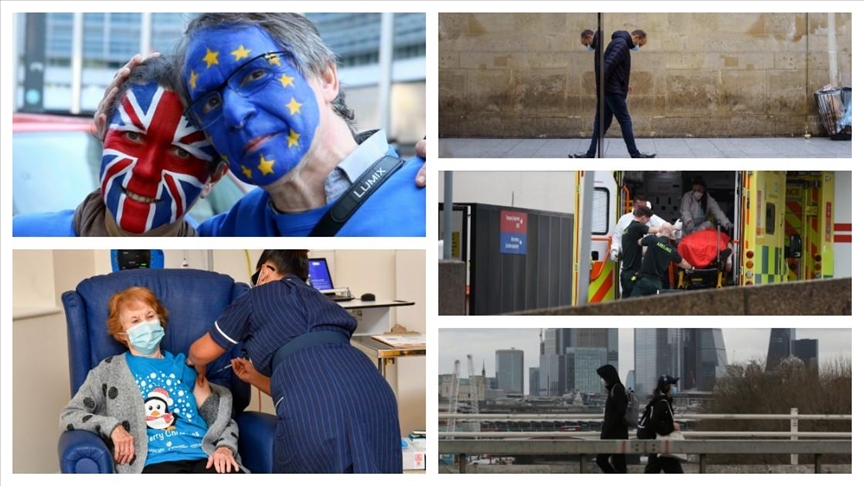ANALYSIS – What caused the fall of UK’s Conservative Party?
Over 14 years, Tories lost British public trust step by step and saw the ultimate punishment on July 4

- British voters made Conservatives pay the price for the cost-of-living crisis, NHS collapse and other missteps
LONDON
The Conservative Party’s 14-year reign has come to an end.
Unofficial results confirm the UK will have a Labour government under Keir Starmer, with a supermajority of more than 410 MPs, while the Conservatives will hold fewer than 120 seats in the House of Commons, making the defeat of a scale likely not seen since 1832.
For Labour, it marks the end of a long wait and a return to power in a time of tumult.
But what went terribly wrong for the Conservatives to simply exhaust their credibility in the eyes of the British public?
Bane of Brexit
Brexit – Britain’s departure from the EU – stands out as the most significant legacy of the Conservative Party.
Initially a campaign pledge for a referendum, the vote to leave the EU resulted in a historic decision in June 2016, followed by Prime Minister David Cameron’s resignation, who had campaigned to remain.
The following years saw political turmoil in the House of Commons as lawmakers spent countless hours finalizing the EU divorce, which was made official on Jan. 31, 2020.
This period saw two more Conservative leaders take office, Theresa May and Boris Johnson.
Despite the promises made before the referendum, the Conservatives have struggled to demonstrate the tangible benefits of Brexit.
To the contrary, the UK has since faced rising living costs, shrinking household budgets, and skyrocketing accommodation prices.
Recent polls indicate people wishing to rejoin the EU now outnumber those who still support Brexit, which is widely regarded as an economic misstep for the UK.
Immigration infamy
Reducing illegal immigration was a key part of the Conservative manifesto, particularly the arrival of small boats from French coasts.
However, Tory voters, who believed these promises, were met with confusing and ineffective actions from successive party leaders.
Recent attempts included boarding illegal migrants on barges and the controversial Rwanda Plan, which aims to send asylum seekers to the African nation for processing.
None of these measures were implemented, leading to growing frustration and disappointment among voters.
COVID chaos
After extending the Conservative mandate in the 2019 general elections, then-Prime Minister Boris Johnson faced the significant challenge of the COVID-19 pandemic.
His initial strategy of allowing the virus to spread for herd immunity backfired, garnering fierce criticism as the casualty count soared.
Johnson was accused of imposing lockdowns too late, resulting in unnecessary deaths.
Public outrage grew when he reportedly told advisers to “let the bodies pile high” during the peak of the crisis. Additionally, investigations into parties held at Number 10 during lockdown further eroded public trust.
Although Johnson attempted to regain support through a rapid vaccination campaign, his approval ratings plummeted, leading to his ousting by his own party.
NHS mess
The UK’s National Health Service (NHS) has deteriorated significantly since the Tories took power in 2010.
Beyond the immense pressure during the COVID-19 pandemic, which saw many hospitals overwhelmed and declaring emergencies, there remains a significant backlog for patients needing treatment for various ailments, including cancer, heart and kidney diseases, and diabetes.
Many patients have had to seek treatment abroad as they could not secure appointments through NHS channels.
This situation has come across to ordinary people as a broken promise from the Tories, who had pledged to fund the NHS instead of contributing money to the EU before and after the 2014 referendum.
Economic woes
The Conservatives faced mounting criticism over their handling of the economy and the rising cost of living.
Under successive leaders, the party struggled to address the financial challenges facing ordinary citizens. Inflation surged and many households found it increasingly difficult to make ends meet.
Critics argued that the government’s policies disproportionately favored the wealthy and did little to alleviate the economic hardships of the broader population.
This discontent significantly eroded support for the Conservative Party and contributed to their electoral downfall.
Truss debacle
As tensions with Russia escalated before the Ukraine war started in February 2022, then-Foreign Secretary Liz Truss received a cold reception in Moscow from Russian Foreign Minister Sergey Lavrov.
Months later, Truss found herself contesting the Conservative leadership against Rishi Sunak after Johnson’s resignation.
Elected as leader and prime minister, she was forced out after just 49 days, as her mini-budget caused financial turmoil and the British pound fell to record lows against the US dollar.
Her brief tenure further damaged public trust in the Conservative Party.
In Thursday’s vote, Truss lost her South West Norfolk seat to Labour, becoming the first former premier to be defeated in an election in more than 100 years.
Sunak’s struggles
Rishi Sunak, who replaced Truss unchallenged, sought to stabilize the economy and achieved partial success.
However, Sunak, who comes from a wealthy background, faced criticism for being out of touch with ordinary people and failing to address the impacts of inflation and rising living costs.
Following the US lead in foreign policy, the Tory government under Sunak continued to support Ukraine with weapons and training, while failing to call for an immediate cease-fire in Israel’s war on Gaza, where it has now killed more than 38,000 Palestinians.
These actions alienated many voters and further damaged the Conservative Party’s reputation.
Anadolu Agency website contains only a portion of the news stories offered to subscribers in the AA News Broadcasting System (HAS), and in summarized form. Please contact us for subscription options.







